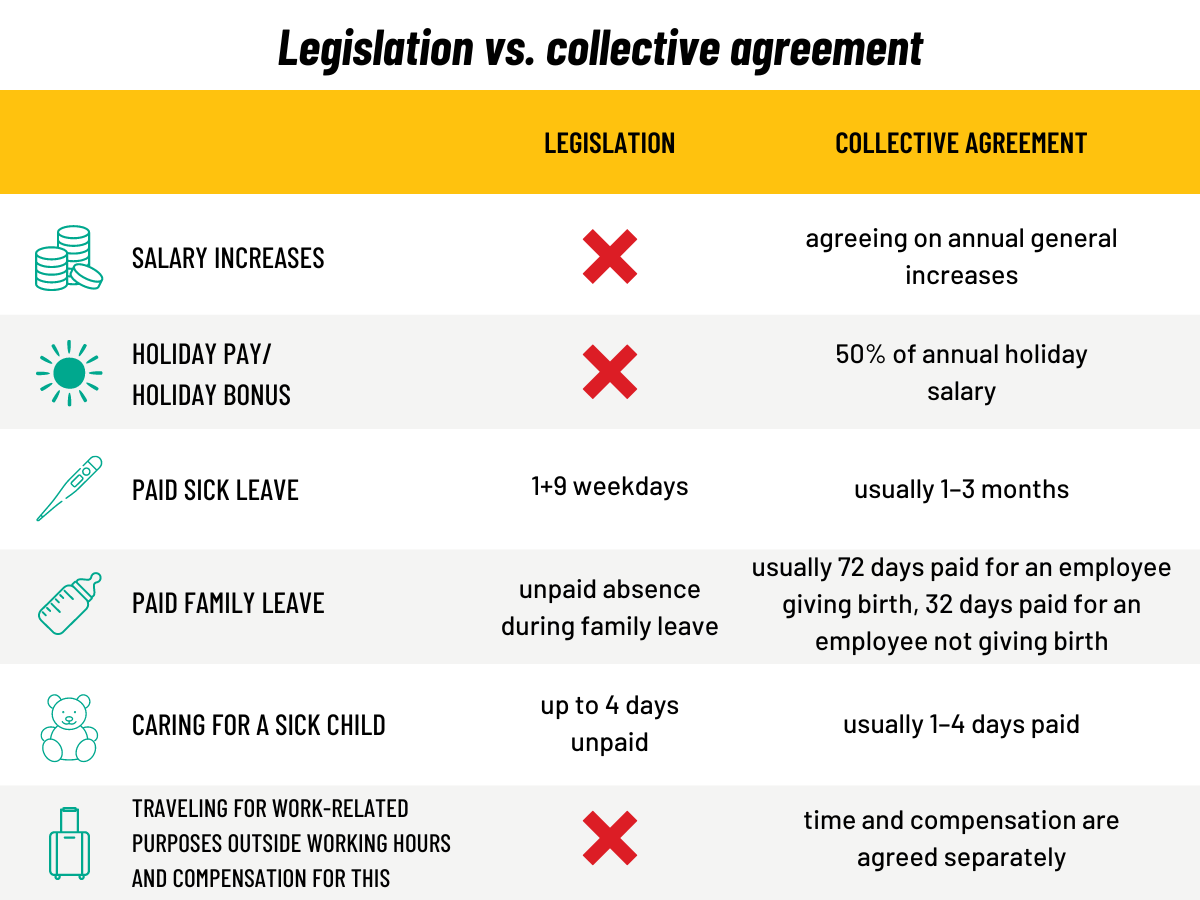The ABC of collective agreement negotiations
14.6.2024 | Work life

What does the collective agreement dictate in an employment relationship? It may come as a surprise to many that the terms of employment are not always based on law, but are agreed upon in collective agreement negotiations.
The collective agreement guarantees more rights than the law
In Finland, several laws provide the employee with security and form the basis of the terms of employment, perhaps the most important of which are the Employment Contracts Act, the Working Hours Act and the Annual Holidays Act. The content of the laws does not yet guarantee employees many familiar benefits, such as holiday pay.
Holiday pay, which is half a month's pay paid (or exchanged for time off) in the summer, is not based on the law on annual leave but on collective agreements. The Employment Contracts Act also defines the right to care for a sick child and maternity leave, but without pay.
This means that the employer is not obligated to pay salary for maternity leave, for example, on the basis of the law alone, but the pay is agreed in the collective agreement.
Nor does the Employment Contracts Act define any longer paid sick leave, but only mentions the payment of salary for the day of illness and the following nine working days.
In sectors where there is no collective agreement (so-called non-contractual sector), the receipt of the above-mentioned benefits is based solely on the employer’s goodwill. There have also been instances where, for example, general increases in salaries have not been paid at all in non-contractual sectors.

Few conditions of employment are a given
The validity of the new collective agreement is always agreed in connection with the collective agreement negotiations, after which new negotiations will be held.
All the matters contained in the previous collective agreement are open in the new negotiations, i.e. nothing will be transferred from the old collective agreement as such to the new one without negotiations.
Many of the terms and conditions of the employment relationship that are considered clear and favorable to employees are renegotiated in connection with each collective agreement. This fall, negotiations will continue in some sectors on whether holiday pay or salary will be paid for family leave. Salary increases paid to everyone as a general increase are also usually agreed in the negotiations.
What happens if there is no collective agreement?
If a resolution on a new collective agreement cannot be reached, industrial action may be pending at the end of the validity period of the previous agreement. These measures may include, for example, an overtime ban or a strike. Collective agreements generally include a labor peace agreement that guarantees that strikes against the collective agreement (employees’ terms of employment) are not possible during the validity of the collective agreement. However, after the end of the collective agreement, its validity will continue with retrospective effect until a new solution is reached.
The solution is primarily sought through agreement, but sometimes measures exerting pressure are necessary to speed up negotiations. A strike is an extreme measure and the participation and support of everyone working in the industry is needed at this time.
Who represents Bachelors of Business Administration in collective agreement negotiations?
The interests of Bachelors of Business Administrations are promoted through the negotiating organizations of Akava, whose activities include experts from our office and our members who act as personnel representatives in different fields.
Bachelors of Business Administration and other Akava employees working in the private sector are represented in the negotiations by the Federation of Professional and Managerial Staff YTN. In the public sector, the contracting party of Akava’s members is the Negotiation Organisation for Public Sector Professionals JUKO.
Make sure your interests are represented in the collective agreement negotiations:

Joonas Kopra
Special Advisor, commercial, finance and IT sector
050 407 4876
joonas.kopra@tradenomi.fi
Lisää aiheesta: Work life

Professionals of Business and Technology Wants to End Degree-Based Discrimination in Recruitment by Municipalities
Opening specialist positions to all with a suitable higher education degree and ensuring the functionality of employment services transferred to municipalities – those are some of the top goals of Professionals of Business and Technology in the upcoming municipal elections.

How are BBA graduates doing on the labor market?
According to Akava, the rise in unemployment is not showing signs of a reversal or slowdown. How are BBA graduates doing on the labor market?

"YAMK" or "maisteri (AMK)"?
YAMK-tutkinto täyttää ensi vuonna jo 20 vuotta, mutta turhan moni kansalainen ei tiedä siitä juuri mitään. Tutkinto on kuitenkin menestynyt ”tutkan alapuolella”, sillä suurin osa tradenomi YAMK-tutkinnon suorittaneista – tai sitä opiskelevista – uskoo tutkinnon edistävän oman osaamisen lisäksi myös työuralla etenemistä.

Salary negotiations and unemployment security in Finland: How they work and what you need to know
As a member of the Professionals of Business and Technology, you will receive personal salary counseling to help you form a realistic salary request. You also are insured against unemployment and will receive unemployment benefit advice.

Why collective agreements matter for workers: key benefits and who negotiates them
Why do collective agreements matter for workers? Read the key benefits and who negotiates!
